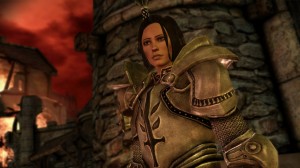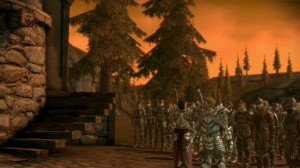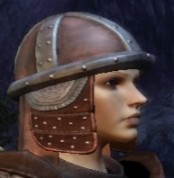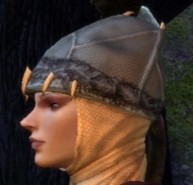I bought Dragon Age: Origins – Awakenings when it first came out a few months back, played for a couple of hours and… just stopped. I think I was a bit Bioware-d out from thoroughly playing through Dragon Age itself and Mass Effect 2 in fairly short order, and Awakenings didn’t ram a crochet hook of pure stimulation up one nostril and yank my brain out through the medium of excitement alone. The icon was sitting on my desktop filed under “must get back to at some point”, and after the Grand Theft Auto IV expansions with their interminable conversations that you have no control over I though it would be nice to actually pick what I got to say for once, fired it back up, got hooked in this time, and played it pretty solidly through to the end.
[The rest of this post has been rated as “Mild” by the British Board Of Possible Spoiler Warnings. No big twists will be revealed, but if you want to know absolutely nothing at all about any aspect of the game, look away now.]
Story-wise, “solid” is probably a fair description; as I said, it didn’t grab me instantly, but in the right frame of mind it’s engaging enough, and there are some interesting revelations about the Darkspawn as you go. In many ways it’s a slightly cut down version of the original, after a brief introduction there’s A City Bit, A Forest Bit, A Spooky Fade Bit and A Dwarf City Bit that you can choose to visit with some interlinking quests, with a Big Final Battle once you’ve completed the other areas. Each segment is quite neat in its own right, and none drag on too long.
Companion-wise only Oghren comes with you from the main game, and hardly develops past Obnoxious Drunk, I never really cared much for him. A couple of new party members are soon available: Anders the Mage who looks and sounds a lot like Alistair in a dress, and Nathanial Howe, son of Arl Howe, who starts off a bit Inigo Montoya (“you killed my father, prepare to die”), but can be conscripted into the party, and I don’t think it would be a massive shock to reveal he can gradually soften to you over time through the right conversation options. Three more are available over the course of the game, a total of six not making quite such a mockery of going adventuring with a party of four while a massive entourage of slackers just hang around the camp. There are no romance options, though, a bit of flirting with Anders was as much as my female Warden could manage, despite there being a perfect rom-com setup with Nathanial (“His father killed her father! She killed his father! Now he’s out to kill her, but through a whacky bunch of hijinks they end up having to save the world together; while looking for Darkspawn, they found each other…”)
Mechanically there’s quite a bit of new stuff to play with. The level cap is raised, with new spells, talents, abilities and specialisations to pick from as you go; where Mass Effect 2 cut right down on the number of activated abilities, by the end of Awakenings my Rogue must have had around 30 icons on the hotbar for assorted attacks, buffs and skills, and few types of health and stamina potion from the inventory (stamina potions being a welcome addition for non-mage classes, who’d previously fling themselves upon opponents using a wide range of devastating moves, get knackered in about seven second flat, and spend the next couple of minutes panting and occasionally auto-attacking). It teeters gently on the edge of being a bit too much, especially for mages, but with the ability to pause in combat you can always spend a while hunting through the spellbook for that situationally useful ability you’re fairly sure you have somewhere.
I scarcely bothered with the crafting options in the original game, finding or buying potions and ignoring traps entirely; Awakenings adds Runecrafting, and a bit of extra weapon damage never hurts (or always hurts, more to the point) so I thought I’d give it a bit of a try. Very broadly, two runes of the same type can be combined into one more powerful rune, and a vendor sells unlimited quantities of the lowest level runes, so to get a level X rune you buy 2X rubbish runes, a stack of consumable-type-stuff, and click away. It’s not a bad system, but each rune takes up one inventory slot, so even if you totally clear your inventory (a difficult task for a compulsive pack rat, even with the storage chest provided) you can only cram in enough raw materials for a couple of the most powerful runes at a time. This wouldn’t be a major problem apart from the fact that I trained one of my party up in Runecrafting instead of learning it myself, and the rune vendor is in your keep, the equivalent of the party camp from the original game where all your companions hang around between questing. As you’re not actually in a party in the keep you can only use your own skills, which meant crafting consisted of buying a load of stuff from the vendor, leaving the keep to form up a party including the runecrafter, standing just outside the door of the keep actually making the runes, running out of ingredients, going back into the keep (disbanding the party) to buy more from the vendor, leaving the keep again… I could’ve respecced my character to learn Runecrafting (official respec books are another addition to Awakenings, though plenty of mods allowed you to do it in the original), then re-respecced afterwards to drop it for more useful talents, but that seemed like a fair bit of hassle as well. Nice idea, perhaps a bit of a MMOG-y timesink, so after creating a couple of uber-runes for my favourite sword I decided to skip the 1% benefit of making a bunch more.
Speaking of crafting, another minor annoyance: Wade the Blacksmith turns up again, and can make powerful weapons and armour from certain rare things you find in your journey. A piece of Heartwood, for example, Wade could turn into a bow or a shield with just a flawless ruby, a bit of catgut, and some oil. Great! I’d found catgut and oil earlier (through the traditional RPG hero method of taking everything you ever see that’s not nailed down), except somehow, either through my own carelessness or a glitch, they didn’t seem to be in my inventory or storage chest; maybe I’d got rid of them while trying to clear space for the runes. Still, something as common as oil, that must be lying around all over the place; store rooms at the castle, merchants are bound to sell it, maybe just pop along to the nearest coast line and scoop some up from a spill… but no. No, apparently oil is just as rare as the living heart of a sapient tree, and there’s only one flask of it in the entire world.
With the arsenal of new abilities I never had too much trouble in combat; I have a suspicion this might be from turning the difficulty down to “Easy” when I made a bit of a start at a second play-through of Origins to get a different ending, and not changing it after installing Awakenings. Even the bigger beasties like dragons went down fairly easily with a bit of pausing and health potion use, I can’t remember having to reload due to party death at all, so it was quite nice as a casual wander around Amaranthine with occasional widespread slaughter. Towards the end of the game I had to choose a party for what I thought would be Something Quite Important But Not The Big Final Battle, picked three characters who volunteered, and was plunged into what turned out to be The Actual Final Ultimate Battle of Finality with three rogues (including me) and a mage. Not really the optimal composition, but they still managed to defeat everything without great difficulty.
All in all, if you liked Dragon Age: Origins, Awakenings is another satisfying dollop of Darkspawn-slaying fun.





